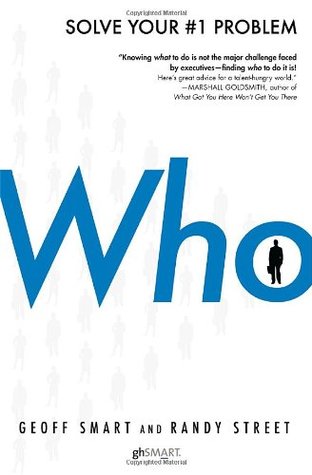‘Who: The A Method for Hiring’ by by Geoff Smart and Randy Street is a fantastic book on hiring with practical advice that saves you time, and prevents you from hiring the wrong people.
Who summary
Here’s a summary of the tips for my own reference (and perhaps, yours):
The goal is to hire ‘A-players’, who are defined as; ‘They have a 90% change of performing as a top 10% candidate’.
Biggest mistakes in the hiring process:
- Make decicion only on gut feeling
- Let everyone interview but unprepered
- Talk, don’t listen
Interview tactics
- Ask ‘What?’, ‘How?’ and ‘Tell me more’ questions
- Interrupt
- Use 3P’s: How does performance compare with – Previous years, Plan, Peers
- Push vs pull: A-players at max 20% pushed out of jobs
How to hire A-players steps;
1. Scorecard:
- Mission of the job
- Outcome
- Competencies
(#1 Competency: Resourcefulness – ‘A combination of drive, passion, analytic ability, decision making, perseverance, resilience, integrity, tenacity, and energy that, when applied, snatches success out of the jaws of defeat. Resourcefulness is figuring out how to get over, around, or through barriers to success, and then doing it.’ A Players are self-correcting success machines
How to Spot Resourcefulness in Topgrading, examples:
- As you conduct the Telephone Screening Interview, ‘A-Player candidates’ say they want a job with challenge and the opportunity to grow, whereas C Players just want a job for the compensation.
- In the Topgrading Interview, A Player candidates show they were repeatedly Resourceful in achieving things. They exude passion, they don’t just give up, they figure things out on their own, they are flexible, they tried things, whereas C Players have “successes” mainly achieved by others and maybe they were part of the team. C Players tend not to admit mistakes or if they do, they show a pattern of not learning from mistakes; they tend to blame the down economy, bosses, lack of resources, and unfairness, but what’s clear is their mediocre results.
- In the Reference Check Interviews, when you’re talking to bosses, constantly look for signs that the candidate was independent, anticipated problems, prevented problems, quickly fixed problems, had that energy and drive, that Resourcefulness… or whether the boss had to do a lot of the “figuring out” and too much time was devoted to fixing problems the candidate caused.
Selection interview via the phone
Screening interview, a 15-30min call. Start with framing – first 10-20 min you talk with a candidate.
Four questions:
- What career do you pursue?
- What are you really good at?
- What are you not so good at or what type of work do you not pursue?
- If you go to next phase we will ask for reference of your previous bosses and co-workers. How will your previous 3 bosses rate your performance on a 1-10 scale WHEN we ask them? (It’s important to emphasize ‘when’ because you will ask them if you proceed.)
Top Grading interview
Ready for the next step, this is in-person.
- What were you hired for? Try to find out their scorecard. Ask how was your success measured?
- What accomplishments are you most proud of?
- What were some low points during that job? Biggest mistake? What did not like about the job?
- Who are the people you worked with? What is the name of your boss? How do you spell it? What was it like to work with her or him? What will your old boss say about your biggest strengths and weaknesses? How would you rate the team you worked with? A, B, or C players?
- Why did you leave that job?
Reference calls
Do not skip this step!
- In what context did you work with our hiring candidate?
- Her/his biggest strengths?
- Biggest areas for improvement back then?
- Rate performance 1-10 scale (should be 8-10, if lower don’t hire). Ask why?
- The candidate told me she/he had difficulties with performing task X. Can you tell me more about it?
Candidate should match skill + will outcome of the job
Hiring offer
Understand their needs and show that you care about what they care about.
5 F’s of selling to the job offer to an A-player:
- Fit – with mission, culture & strategy of the company + skills & competencies needed for the job
- Family – address that you understand the troubles of changing jobs
- Freedom – make decisions
- Fortune – stability of our company + compensation
- Fun –




